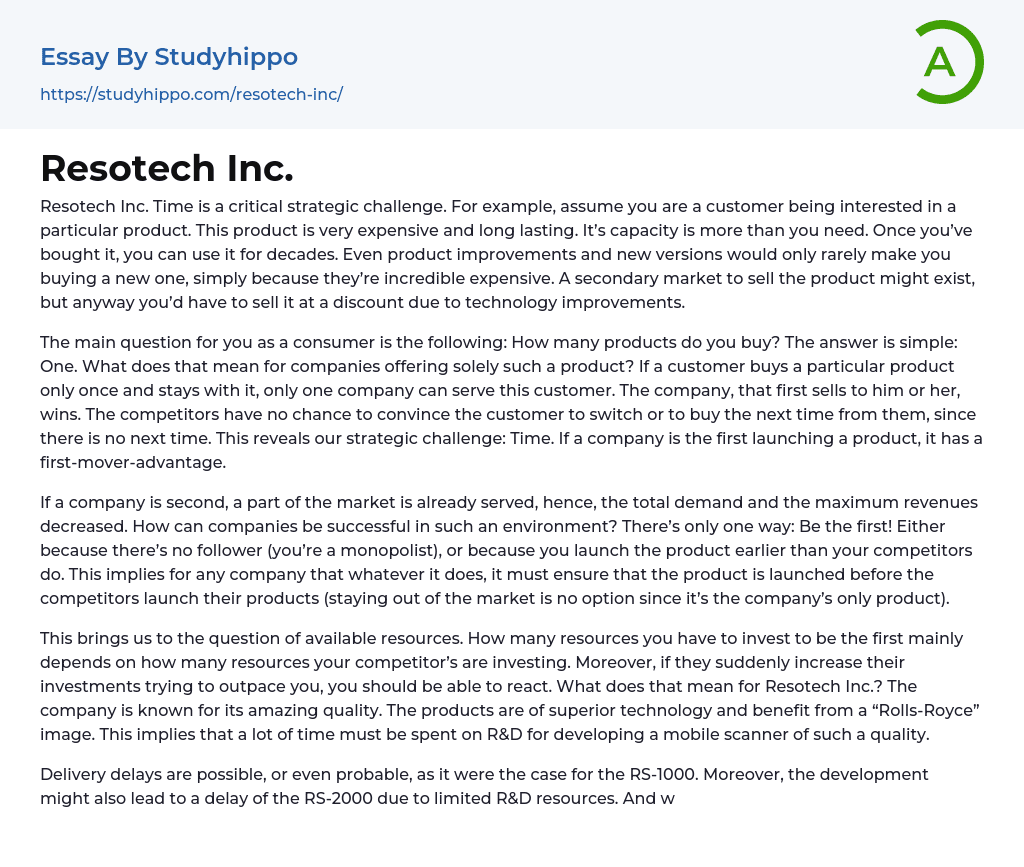Resotech Inc. Time is a critical strategic challenge. For example, assume you are a customer being interested in a particular product. This product is very expensive and long lasting. It’s capacity is more than you need. Once you’ve bought it, you can use it for decades. Even product improvements and new versions would only rarely make you buying a new one, simply because they’re incredible expensive. A secondary market to sell the product might exist, but anyway you’d have to sell it at a discount due to technology improvements.
The main question for you as a consumer is the following: How many products do you buy? The answer is simple: One. What does that mean for companies offering solely such a product? If a customer buys a particular product only once and stays with it, only on
...e company can serve this customer. The company, that first sells to him or her, wins. The competitors have no chance to convince the customer to switch or to buy the next time from them, since there is no next time. This reveals our strategic challenge: Time. If a company is the first launching a product, it has a first-mover-advantage.
If a company is second, a part of the market is already served, hence, the total demand and the maximum revenues decreased. How can companies be successful in such an environment? There’s only one way: Be the first! Either because there’s no follower (you’re a monopolist), or because you launch the product earlier than your competitors do. This implies for any company that whatever it does, it must ensure that the product is launched before the competitor
launch their products (staying out of the market is no option since it’s the company’s only product).
This brings us to the question of available resources. How many resources you have to invest to be the first mainly depends on how many resources your competitor’s are investing. Moreover, if they suddenly increase their investments trying to outpace you, you should be able to react. What does that mean for Resotech Inc.? The company is known for its amazing quality. The products are of superior technology and benefit from a “Rolls-Royce” image. This implies that a lot of time must be spent on R&D for developing a mobile scanner of such a quality.
Delivery delays are possible, or even probable, as it were the case for the RS-1000. Moreover, the development might also lead to a delay of the RS-2000 due to limited R&D resources. And what if the competitors enter the market as well? One can argue that Resotech might be able to discourage other companies to enter the mobile market once they committed themselves. However, this is unlikely for two reasons: First, Resotech is a relatively small company. Larger companies such as GE, Siemens, and Picker will probably have a shorter product development cycles due to their huge financial reserves and experience.
Second, Resotech aims for high quality products. Competitors are able to produce less advanced scanners and enter the market first. In contrast, this is no option for Resotech. Moreover, Resotech would have to acquire new personnel first. To summarize, Resotech could sell 25 units. However, there’s a risk that Resotech is not able to stick to its delivery schedule,
since the development of a mobile product is “not a piece of cake”. This may result in penalties. Additionally, if we try to stick to the schedule with a less advanced product, we will damage our image as quality leader.
Moreover, what if 25 units are not enough to break even and another competitor has already entered the market? If Resotech accepts the offer, it won’t have any spare resources to accelerate R&D to outpace potential entrants. On top of that, we put the RS-2000 at a risk of being launched too late, since we might face a shortage of R&D capacity for both products. Therefore, from a time point of view, I recommend to decline the offer. Thereby we can focus on the RS-2000 and launch it earlier. Declining would be less risky, but maybe less profitable. It’s the safe way.
- Chief Executive Officer essays
- Convenience Store essays
- Firm essays
- Training And Development essays
- Unilever essays
- Variable Cost essays
- Virgin Group essays
- Bargaining essays
- Entity essays
- Pest analysis essays
- Leadership and Management essays
- Change Management essays
- Project Management essays
- Knowledge Management essays
- Operations Management essays
- Quality Management essays
- Risk Management essays
- Scientific Management essays
- supply chain management essays
- Performance Management essays
- Time Management essays
- Brand Management essays
- Total Quality Management essays
- Risk essays
- Manager essays
- Leadership essays
- Business Ethics essays
- Board Of Directors essays
- Product Management essays
- Comparative Analysis essays
- Decision Making essays
- Dispute Resolution essays
- Stress Management essays
- Business Management essays
- Brand Equity essays
- Branding essays
- Nike, Inc. essays
- Market share essays
- Razor essays
- Being A Leader essays
- Servant Leadership essays
- Leadership Experience essays
- Leadership Qualities essays
- Incentive essays
- Advertising essays
- Audience Theory essays
- Competitor Analysis essays
- Consumer essays
- Marketing Management essays
- Marketing Mix essays




